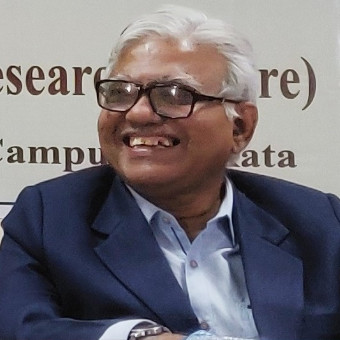
M Sc in Anthropology, University Of Calcutta, 1971, PhD in Sociology, 1993., BU. Professional Associate, Certificate Social forestry workshop –
East-West Centre, Hawaii, USA, Fellow West Bengal Academy of Science And Technology.
Former Professor at the VGSOM Indian Institute OF Technology, Kharagpur, Former Visiting Professor at the Rural Development Centre Indian Institute OF Technology, & Ex-STA at the Anthropological Survey Of India.
Ex Visiting Professor at different university from time such as at the IDPM University Of Manchester, Helsinki Finland, SWFC Kunming China, Gadja Mada University Indonesia.
Honorary Chairman, Indian Institute of Bio-Social Research and Development (IBRAD) Training, Education, Action Research, and Development Consultancy,
Honorary Chairman, Indian Institute of Bio-Social Research and Development (IBRAD) Training, Education, Action Research, and Development Consultancy,
Former Member, Expert Committee of Biodiversity Management Committee under National Biodiversity Authority, Government of India,
Coordinator: North East states for BMC under NBA.
Former Member Advisory Board Ministry Of culture.
Former Member Academic council. National Museum Institute
Highest number of trainings conducted through Training Need Assessment and Strategic Planning in the field of Joint Forest Management and community development as a professional trainer.
International Trainer from India to conduct training and workshop in UK, USA, Germany, Finland, China, Indonesia, Thailand and Nepal in the field of Community Forestry, Participatory Forest Management and Social Development since 1993.
He unified concepts of the biological, social and ecosystem as a whole and developed simple, practical, strategic coherent approaches for demonstrative models of Ecosystem-Based Approaches for Participatory Biodiversity Management and Sustainable Livelihood, in number of states of India. Such models have been adopted by the government functionaries and the community organisations for collaborative management of the natural resources like Forest, Agriculture, Water- Fishery, Livestock. Thus applying the coherent body of knowledge and skills he has been conducting research, training and formal academic programs, accredited with recognised body to address the problem of severe degradation of natural resources and social environment, upon which human survival depends.
His training as an Ecological Anthropologist and has helped in gaining insights of understanding community institution development for conservation of natural resources, developing criteria and indicators for participatory monitoring of natural resources including biodiversity monitoring, involve community for participatory planning in the form of micro-planning for natural resource conservation and livelihood in the context of climate change, developing standards, norms and rituals for sustainable management of natural resource base across varying agro-climatic conditions.
He has developed the concept of Bilateral Matching Institutions, involving government and the community institutions to address the issues of Natural Resource Management, Participatory Biodiversity Monitoring, and Micro Water Management to facilitate the process of making informed decisions to promote community-based conservation of natural resources.
The concept of identification of proactive community members (Self-Initiated Community Organisers), Eco Chain ( PANCHATATVA ) and develop a network of such community leaders ( SANCALP) as a critical mass to address the challenges of natural resources conservation-based livelihood by forming a cohesive body and process of institution building ( SAPTASWAR) has yielded positive results across the country.
Such knowledge base has helped in developing the methodology, criteria and indicators for identifying the drivers of degradation of a given ecosystem and their monitoring by involving the community in more than 10 states of India.
Blog
Practicing Anthropology
Realizing the multiple challenges of poverty, dwindling of the forest resource...
Facilitating Social Change
Lorem ipsum dolor sit amet, consectetur adipiscing elit, sed do eiusmod tempor inci...


















 26 Dec 2019
26 Dec 2019 0 Reacties
0 Reacties